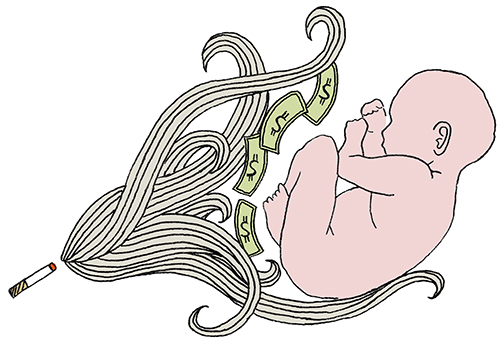Headlines are a great way to gauge how judgmental you are. The saying “Don’t judge a book by its cover” is almost irrelevant since people don’t read those any more. It’s all about headlines, bylines and taglines. It’s the two seconds when a cleverly crafted phrase catches your eye and tells you its story before you move on to the next one. They’re loaded these days—they have to be.
Pregnant women paid to give up cigarettes

Headlines are a great way to gauge how judgmental you are. The saying “Don’t judge a book by its cover” is almost irrelevant since people don’t read those any more. It’s all about headlines, bylines and taglines. It’s the two seconds when a cleverly crafted phrase catches your eye and tells you its story before you move on to the next one. They’re loaded these days—they have to be.
I got a good sense of my judgy-ness when I recently read the headline: “Eugene CCO to pay pregnant women to stop smoking.” My response was anything but empathetic, and within minutes I’d thought of 20 other things that funding could, and should, go to. If having a baby isn’t reason enough to stop smoking, I don’t know what to tell you.
I was embarrassed by it. Embarrassed for the mothers. Embarrassed for the program. I tried to imagine how it would feel to be paid to protect the life of my child. That’s when I stopped. I couldn’t imagine it. I also couldn’t fathom trying to come off 10 cigarettes a day with no one there to support me.
That was Heidi Zauner’s story. She told Oregon Public Broadcasting that when she found out she was pregnant she was smoking half a pack every day. I’ve never smoked, except for the predictable few puffs in high school to prove I was…something. Not sure what. I have no idea what it feels like to be addicted to a substance as strong as nicotine. I’m addicted to coffee and that’s bad enough.
According to the OPB report, 40 percent of women on the Oregon Health Plan who are of “child-bearing age” know what it feels like. Thirty-two percent of them continue to smoke while pregnant. Yet how many girls grow up thinking they’d like to smoke throughout their pregnancy and put their babies at risk? Still, many of us look at women who do and roll our eyes with disgust.
There’s no justification for knowingly putting your baby’s health at risk. That’s a given. But when was the last time you or anyone you knew changed their behavior in response to being shamed?
Perhaps it’s not about justifying it but more about understanding it. The Trillium Community Health Plan is providing women with the one thing that most, if not all, of us need to succeed—empathy and community.
Sure, it’s possible to go through the horrible experience of withdrawal alone, and more power to those who can, but it’s so much better when someone is there next to you. That’s what this program is, really. With no judgment, it welcomes pregnant women who smoke, has them pick a quit date and signs them up for counseling.
These women come in at set intervals during their pregnancy to be tested for signs of nicotine. If negative, they’re given a gift card to a store where they can buy groceries, baby clothes or household items. Each time they prove they haven’t been smoking they get another gift card, and the amounts increase the longer they test negative. If they fall off the wagon they start over again, but they aren’t kicked out of the program.
You might wonder why those who consistently take care of themselves and their children aren’t rewarded instead of those who can’t seem to get it together. After all, isn’t this setting a precedent of rewarding bad behavior, leaving the door open for countless opportunities for people to abuse the system?
Perhaps. Then again, perhaps it’s also stretching out a hand to help someone who desperately needs it. Someone like Holly Puzio, a 22-year-old mother of a 4-year-old with another on the way who’s trying to find a place to stay and who’s stressed out of her wits.
Yes, we could all ask her how she got herself into that situation in the first place, but throwing stones is easy. I was ready to throw one, especially when I thought of little babies being born with nicotine in their system. So why not do everything we can to make sure that doesn’t happen?




